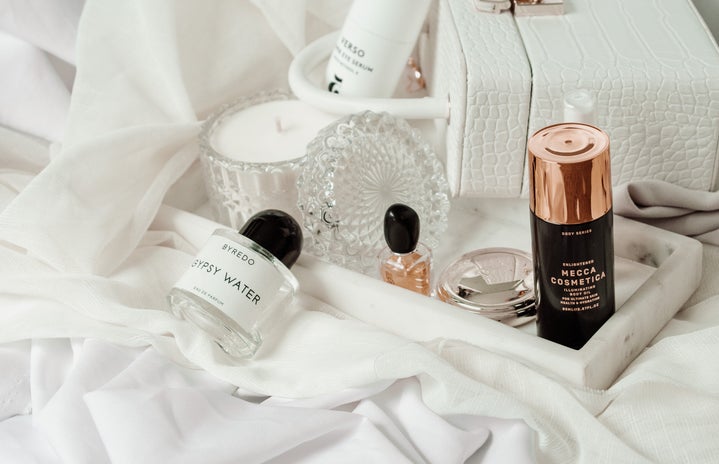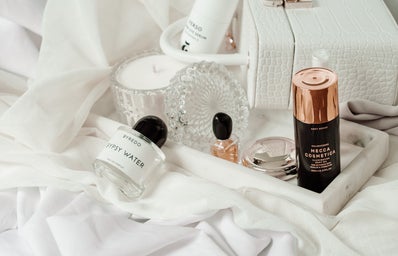It’s hard enough dealing with acne on your face, but when those ugly red bumps show up in other places, it can be even more difficult to get rid of them. Lucky for collegiettes, Dr. Emmy Graber, a dermatologist at Boston Medical Center and the Boston University Cosmetic and Laser Center, has some advice for preventing and treating body acne. We all know the best bikini accessory is clear, smooth skin, and with Graber’s advice, your back and shoulders will look great all summer long.
What causes body acne?
Graber attributes the main causes of body acne to a combination of bacteria and hormones, but she also says that a person’s genetics play a key role as well. “Certain people are just more prone to acne than others,” she says. “For them, it’s difficult to actually prevent body acne.” Graber says that if your body produces more oil, also known as sebum, you will be more prone to acne. You can’t help your genetics, but there are other ways to prevent body acne.
How to prevent body acne
Wash after you work out.
Graber says that not changing your clothes or washing yourself immediately after sweating a lot can cause body acne. Sweat, dirt, and bacteria clog pores, so the longer a person lets them stay on her body, the greater chance she has of getting body acne. There’s nothing in sweat itself that causes acne, but its extended presence on the body mixed with dirt is what clogs pores and creates acne. You can’t help sweating when you work out, but you definitely want to get that gross stuff off before it has time to clog your pores. The worst thing you can do is let the sweat dry on your skin, so hit the shower right after you exercise!
Wear loose clothing.
Graber also advises that you wear loose workout clothes because tight clothing can cause or worsen breakouts if you are already prone to body acne. Tight clothes can also clog your pores, so you definitely don’t want to combine that with sweat and dirt. Keep this in mind the next time you’re choosing between a tight workout top and a loose T-shirt. That way, after you work out, you’ll be able to show off your toned back and shoulders without worrying about bumps!
Reduce your stress.
Another cause of acne is stress, so Graber also encourages collegiettes to reduce stress in their daily lives. Taking a deep breath every once in while can be surprisingly helpful in clearing your skin. Although you may be working endless hours at a summer job or internship, schedule some time for yourself to decompress. Your back and shoulders will thank you for it.
Overall, Graber wants collegiettes to know that it’s not always possible to prevent body acne, but there are definitely ways you can treat it, either with over-the-counter washes and creams or prescription medicine. For optimal results, she advises a combination of both.
How to Treat Body Acne
Over-the-counter products
Graber does not advise the use of any singular product to get rid of body acne. Instead, she advises collegiettes to look for products that contain benzoyl peroxide or salicylic acid. She says that you should look for washes and creams that contain 2 to 10 percent benzoyl peroxide. Interestingly, Graber states that a higher benzoyl peroxide percentage won’t necessarily work better, but it will dry your skin out. She also advises looking for products that contain 1 to 2 percent salicylic acid. These percentages are only available with over-the-counter products because these are the only amounts that meet FDA approval.
All of Neutrogena’s Body Clear body washes and body scrubs contain 2 percent salicylic acid. Clearasil Ultra Rapid Action Daily Gel Wash and OXY Acne Solutions Hydrating Body Wash also contain 2 percent salicylic acid. Neutrogena’s On the Spot Acne Treatment is one of the few acne creams that includes less than 10 percent benzoyl peroxide (2.5 percent), which is what Graber advises for spot treatments. All of these products can be bought at most pharmacies and grocery stores, so you should have no problem finding one that works for you.
If you’re looking to save money on your skincare, many pharmacies also offer store brand versions of these products, which contain the same amount of salicylic acid or benzoyl peroxide as Neutrogena for a lower price. Also, you don’t necessarily have to buy a product that specifically says “body wash,” as Graber says that facial washes and creams will work just as well on the rest of your body.
Prescription products
If over-the-counter products aren’t working for you, you might want to look into getting a prescription solution. “If the acne is not getting better and/or it is psychologically bothering, one should see a physician,” Graber says. When you speak with a dermatologist, you should ask about the medicine “tretinoin.” One brand name of this prescription is Retin-A, which is a vitamin A prescription cream. Graber says that this prescription cream clears up both facial and body acne on most people.
Besides tretinoin, Graber also says that some antibiotic creams and antibiotic pills can help take care of acne. She adds that isotretinoin, which comes in pill form, can be taken to treat acne. Certain hormone treatments, such as birth control pills, may also be useful in treating acne.
For best results, Graber advises combining washing once or twice a day with an over-the-counter acne wash in conjunction with prescription medicine given by a dermatologist.
Besides over-the-counter washes and prescription pills, Graber says that another important tool to treat body acne is patience. Although antibiotic or isotretinoin pills will get rid of both facial and body acne, Graber notes that it will take longer for the pills to work on acne that occurs on the back and shoulders. However, she affirms that the pills will eventually work on all forms of acne, so you just have to wait for them to go into effect. She also adds that body acne is generally more difficult to treat than facial acne simply because it’s harder to get a lot of the creams on certain back and chest areas. Although it may be tricky to get to those hard-to-reach places, with the right products and determination, anyone can overcome body acne.

